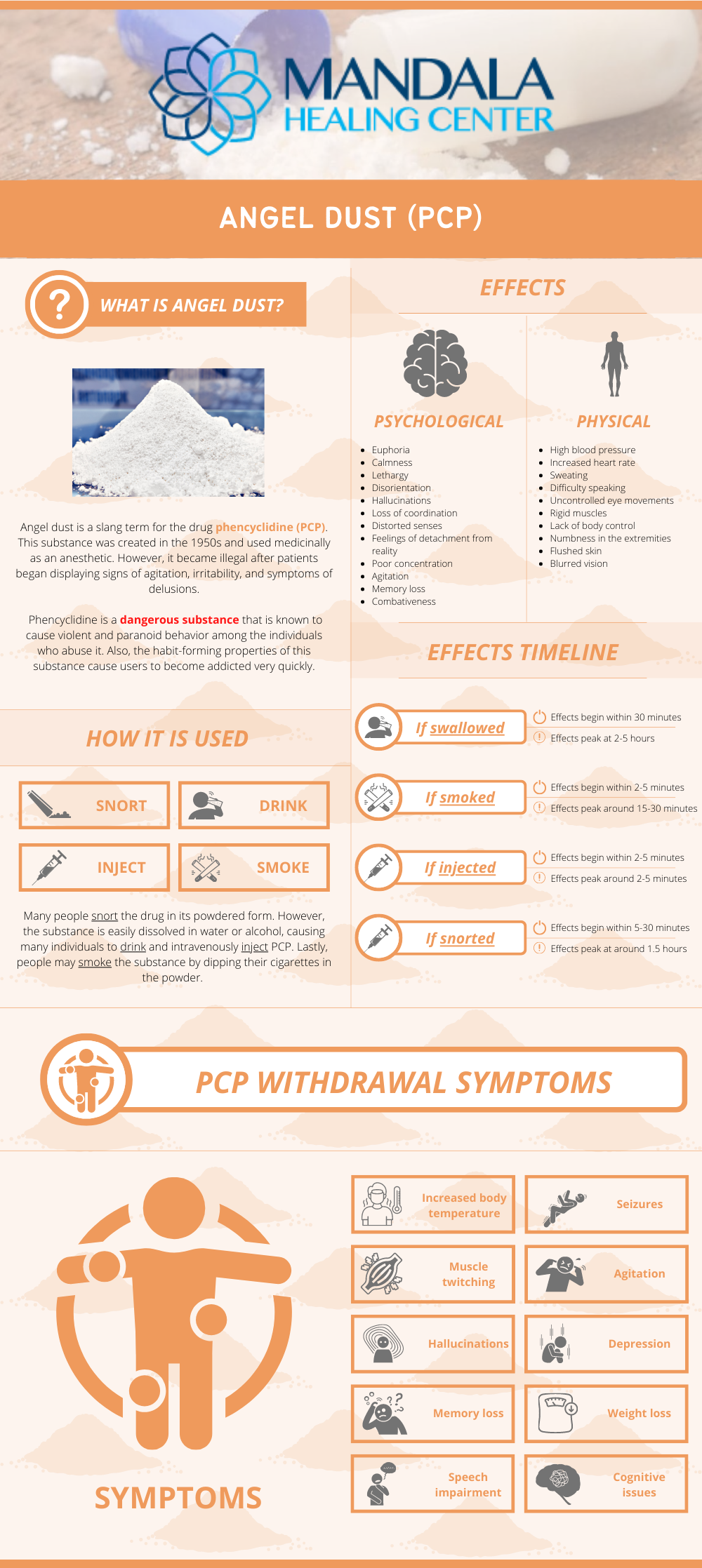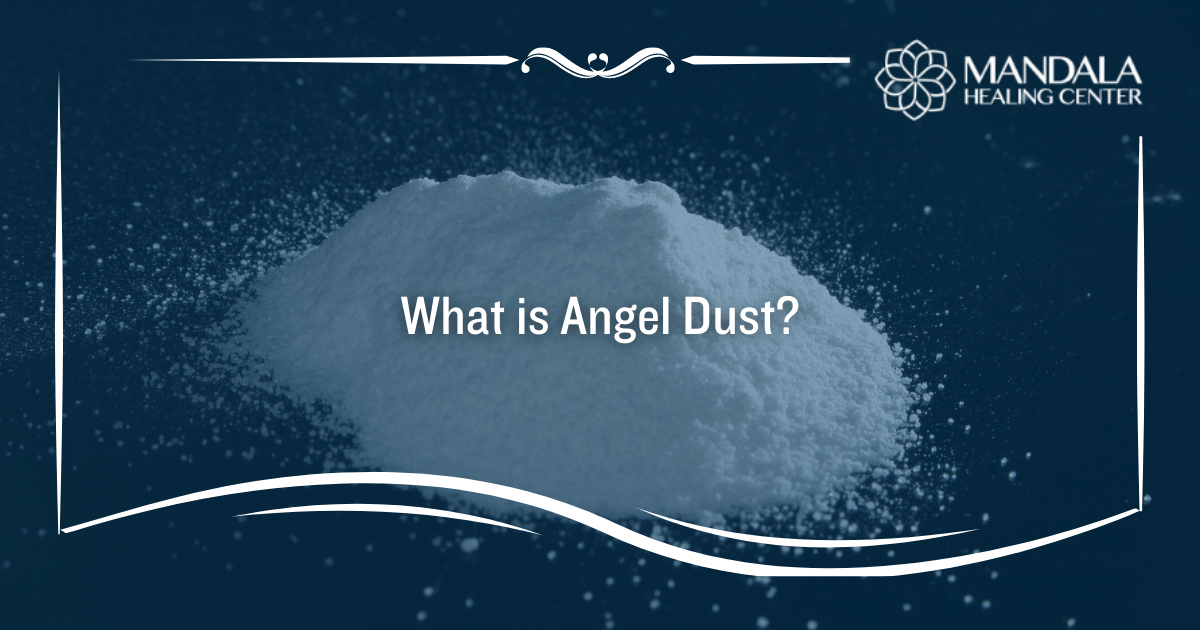Angel dust is a slang term for the drug phencyclidine (PCP). This substance was created in the 1950s and used medicinally as an anesthetic. However, it became illegal after patients began displaying signs of agitation, irritability, and symptoms of delusions.
While PCP is no longer used medicinally, this drug has made its way onto the streets. People abuse the drug for the mind-altering hallucinogenic effects that it causes. According to the National Drug Intelligence Center, “an estimated 6 million U.S. residents aged 12 and older used PCP at least once in their lifetime.”[1]
Phencyclidine is a dangerous substance that is known to cause violent and paranoid behavior among the individuals who abuse it. Also, the habit-forming properties of this substance cause users to become addicted very quickly.

How is Angel Dust Used?
Angel dust is a bitter-tasting white, crystalline powder.
Many people snort the drug in its powdered form. However, the substance is easily dissolved in water or alcohol, causing many individuals to drink and intravenously inject PCP. Lastly, people may smoke the substance by dipping their cigarettes in the powder.
How long it takes the effects of PCP to begin depends on their method of use. If the drug is swallowed the effects begin to appear within 30 minutes, peaking at around 2 to 5 hours. If an individual smoked PCP, the effects start in about 2 to 5 minutes, peaking between 15 to 30 minutes later. Lastly, individuals who inject the drug will experience effects within 2 to 5 minutes at peak potency.
People who use this substance may not refer to it by its actual name. This is usually to avoid being caught by their friends, family, or the authorities. The street names for phencyclidine include:
- Angel dust
- Wet
- Shermans
- Sherm sticks
- Happy sticks
- Dipper
- Embalming fluid
- Killer weed
- Hog
- Ozone
- Rocket fuel
- Supergrass
- Whack
The Effects of Angel Dust
Angel dust is believed to be one of the most dangerous drugs to abuse. This is primarily because the substance can cause individuals to feel distant and detached from reality – even in small doses.
PCP affects the central nervous system and changes the way an individual thinks, behaves, and feels. Even more concerning, this substance inhibits the reuptake of neurotransmitters such as dopamine, norepinephrine, and serotonin. Also, it blocks NMDA receptors which are responsible for pain sensation, emotions, learning, and memory functions.
When an individual uses angel dust, it is common for them to feel separated from their body and surroundings due to its dissociative effects. Abusing phencyclidine causes symptoms such as:[2]
- Numbness of the extremities
- Slurred speech and loss of coordination
- Sense of strength and invulnerability
- Staring blankly
- Rapid and involuntary eye movements
- Exaggerated gait or stumbling around while walking
- Auditory and visual hallucinations
- Anxiety and feelings of impending doom
- Paranoia
- Violent behavior
- Psychosis similar to that of schizophrenia
Even low doses of PCP can lead to a rapid heartbeat and a shallow respiration rate. With that being said, high doses of this drug could quickly lead to potentially life-threatening effects such as:[2]
- Decreased blood pressure, pulse rate, and respiration rate
- Nausea and vomiting
- Blurry vision
- Eyes moving up and down in a flicking motion
- Drooling
- Loss of balance
- Extreme dizziness
- Violent behavior towards others
- Suicidal ideation and attempts
A PCP overdose could lead to seizures, coma, and death. If an individual is displaying concerning symptoms after ingesting PCP, contact emergency medical services immediately.
Can You Get Addicted to Angel Dust?
It is possible and extremely likely for individuals who abuse PCP to become addicted to the drug. This substance is known to cause psychological and physical symptoms of dependency. Because of this, individuals who abruptly stop using angel dust will experience withdrawal symptoms.
The symptoms of PCP withdrawal include:
- Increased body temperature
- Seizures
- Muscle breakdown and twitching
- Agitation
- Hallucinations
- Depression
- Memory loss
- Weight loss
- Speech impairment
- Cognitive issues
Because PCP withdrawal can cause severe symptoms like hallucinations, seizures, and cognitive impairment, individuals attempting to quit this drug should always attend a professional detox program.
Dangers of Long-Term Phencyclidine Abuse
One of the main risks of long-term PCP abuse is its propensity to cause psychosis. To explain, psychosis is a mental condition that causes individuals to become disconnected from reality while experiencing hallucinations, delusions, and paranoia. The psychosis associated with this drug has been described as indistinguishable from that of schizophrenia.
Adolescents and teenagers who abuse this drug can experience hormonal effects that inhibit normal growth and development. Additionally, angel dust can cause teenagers to experience significant cognitive and learning disadvantages.
Additional dangers of long-term PCP abuse include:
- Seizures
- Coma
- Accidental injury or suicide
- Kidney failure
- Heart arrhythmias
- Muscle rigidity
- Violent behaviors resulting in legal issues
- Memory loss
- Difficulty with speech like slurring words or stuttering
- Weight loss persisting for up to a year after sobriety
The long-term effects of phencyclidine abuse are concerning and potentially life-threatening. However, many of these adverse consequences are reversible with extensive addiction treatment and medical care.
Finding Help for PCP Abuse and Addiction
If you or a loved one abuses angel dust or PCP, it may be time to consider attending addiction treatment. This substance is extremely dangerous and can cause individuals to develop psychosis, suffer from seizures, go into a coma, and even die.
Attending a professional substance use disorder rehab will prevent you or your loved one from experiencing the severe consequences of long-term angel dust abuse. Contact Mandala Healing Center today for more information on our South Florida addiction treatment programs.
References:












